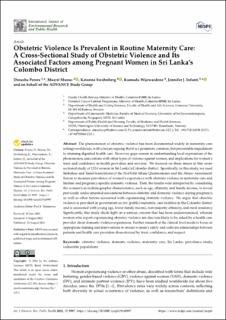| dc.contributor.author | Perera, Dinusha Chamanie | |
| dc.contributor.author | Munas, Muzrif | |
| dc.contributor.author | Swahnberg, Katarina | |
| dc.contributor.author | Wijewardene, Kumudu | |
| dc.contributor.author | Infanti, Jennifer | |
| dc.date.accessioned | 2023-01-20T09:44:05Z | |
| dc.date.available | 2023-01-20T09:44:05Z | |
| dc.date.created | 2022-08-15T17:11:19Z | |
| dc.date.issued | 2022 | |
| dc.identifier.issn | 1661-7827 | |
| dc.identifier.uri | https://hdl.handle.net/11250/3044886 | |
| dc.description.abstract | The phenomenon of obstetric violence has been documented widely in maternity care settings worldwide, with scholars arguing that it is a persistent, common, but preventable impediment to attaining dignified health care. However, gaps remain in understanding local expressions of the phenomenon, associations with other types of violence against women, and implications for women’s trust and confidence in health providers and services. We focused on these issues in this cross-sectional study of 1314 women in Sri Lanka’s Colombo district. Specifically, in this study, we used Sinhalese and Tamil translations of the NorVold Abuse Questionnaire and the Abuse Assessment Screen to measure prevalence of women’s experiences with obstetric violence in maternity care and lifetime and pregnancy-specific domestic violence. Then, the results were interpreted by considering the women’s sociodemographic characteristics, such as age, ethnicity, and family income, to reveal previously undocumented associations between obstetric and domestic violence during pregnancy, as well as other factors associated with experiencing obstetric violence. We argue that obstetric violence is prevalent in government-sector (public) maternity care facilities in the Colombo district and is associated with young age, lower family income, non-majority ethnicity, and rural residency. Significantly, this study sheds light on a serious concern that has been underexamined, wherein women who report experiencing obstetric violence are also less likely to be asked by a health care provider about domestic violence experiences. Further research at the clinical level needs to focus on appropriate training and interventions to ensure women’s safety and cultivate relationships between patients and health care providers characterized by trust, confidence, and respect. | en_US |
| dc.description.abstract | Obstetric Violence Is Prevalent in Routine Maternity Care: A Cross-Sectional Study of Obstetric Violence and Its Associated Factors among Pregnant Women in Sri Lanka’s Colombo District | en_US |
| dc.language.iso | eng | en_US |
| dc.publisher | MDPI | en_US |
| dc.relation.uri | https://www.mdpi.com/1660-4601/19/16/9997/htm | |
| dc.rights | Navngivelse 4.0 Internasjonal | * |
| dc.rights.uri | http://creativecommons.org/licenses/by/4.0/deed.no | * |
| dc.title | Obstetric Violence Is Prevalent in Routine Maternity Care: A Cross-Sectional Study of Obstetric Violence and Its Associated Factors among Pregnant Women in Sri Lanka’s Colombo District | en_US |
| dc.title.alternative | Obstetric Violence Is Prevalent in Routine Maternity Care: A Cross-Sectional Study of Obstetric Violence and Its Associated Factors among Pregnant Women in Sri Lanka’s Colombo District | en_US |
| dc.type | Peer reviewed | en_US |
| dc.type | Journal article | en_US |
| dc.description.version | publishedVersion | en_US |
| dc.source.volume | 19 | en_US |
| dc.source.journal | International Journal of Environmental Research and Public Health (IJERPH) | en_US |
| dc.source.issue | 16 | en_US |
| dc.identifier.doi | 10.3390/ijerph19169997 | |
| dc.identifier.cristin | 2043191 | |
| dc.relation.project | Norges forskningsråd: 220893 | en_US |
| cristin.ispublished | true | |
| cristin.fulltext | original | |
| cristin.qualitycode | 1 | |

